ICR24 Keynote Speakers and Panelists
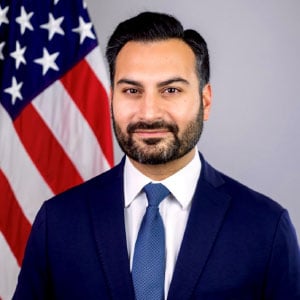
Ali Zaidi
National Climate Advisor
Ali Zaidi serves as Assistant to the President and National Climate Advisor. In this role, he leads the White House Climate Policy Office, which coordinates policy development and President Biden’s all-of-government approach to tackle the climate crisis, create good-paying, union jobs, and advance environmental justice. Zaidi is a longtime advisor to President Biden, having provided counsel and leadership on climate policy development, legislation, and executive action from day one of the Administration and on the Biden presidential transition and campaign. Before his current role, he served as Deputy National Climate Advisor.
During his time in the Biden-Harris Administration, Zaidi has led on efforts to re-establish U.S. climate leadership, set a national target to cut greenhouse gas emissions by 50-52 percent by 2030; deliver robust executive actions, including regulatory, investment, and procurement-based initiatives; and secure the largest legislative wins on climate in U.S. history, through the Bipartisan Infrastructure Law and Inflation Reduction Act. Together these efforts have advanced the largest annual deployment of solar, wind, and batteries; brought together the U.S. auto sector around an all-electric future; tackled super-pollutants like methane and HFCs; bolstered domestic adaptation and resilience; and centered U.S. climate action around workers and communities, prioritizing good-paying union jobs and the critical work of environmental justice.
Zaidi joined the Biden-Harris Administration after serving as the state of New York’s Deputy Secretary for Energy and Environment and Chairman of Climate Policy and Finance, where he led the state's efforts on climate change — driving investment into infrastructure and innovation, empowering workers and communities, and boosting economic and environmental resilience. Zaidi also taught graduate courses on technology policy and studied the fiscal and financial impacts of climate change as an adjunct professor at Stanford University. During that time, Zaidi also co-founded Lawyers for a Sustainable Economy, a Stanford-coordinated initiative that equips sustainability-focused startups with pro bono legal services.
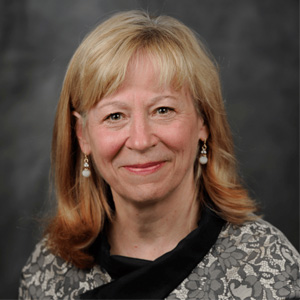
Dr. Geri Richmond
Under Secretary for Science and Innovation, U.S. Department of Energy (DOE)
Geraldine (Geri) Richmond is the Under Secretary for Science and Innovation at the Department of Energy (DOE). In this role she oversees DOE's Office of Science, the nation’s largest federal sponsor of basic research in the physical sciences, DOE’s applied R&D areas of nuclear, fossil, and renewable energy, and energy system integrity, and the DOE national laboratories and their facilities.
She is currently on leave from the University of Oregon where she holds the Presidential Chair in Science and Professor of Chemistry. Richmond's research throughout her career has been on the use of laser-based and computational methods to understand the molecular, adsorption structure and dynamics at liquid surfaces that have relevance to environmental and technological interests.
She is a member of the U.S. National Academy of Sciences and the American Academy of Arts and Sciences and has been honored by numerous awards including the National Medal of Science (2016), the Priestley Medal from the American Chemical Society (2018) and the Linus Pauling Medal Award (2018).
Her service to the nation includes serving two terms as a presidential appointee to the National Science Board (2012-2021) and as the U.S. State Department Science Envoy for the Lower Mekong River Countries (2015-2016). In addition to serving on many other national and international advisory boards, Richmond has been President of the American Association for the Advancement of Science (AAAS) and Sigma Xi, and the Scientific Research Honor Society.
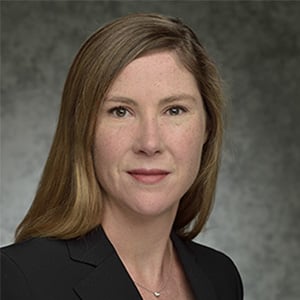
Kelly Cummins
Acting Director, Office of Clean Energy Demonstrations, U.S. Department of Energy (DOE)
Kelly Cummins is the Acting Director for the Office of Clean Energy Demonstrations (OCED) at the U.S. Department of Energy (DOE). In this role, she is responsible for delivering more than $25 billion in funding to support large-scale clean energy demonstration projects.
Cummins has worked in the field of national and energy security at DOE for more than 20 years. Prior to her role in OCED, Cummins served as the Associate Deputy Director for Field Operations in the Office of Science, where she was responsible for management and operational oversight of the Office of Science field complex, including 10 national laboratories executing leading scientific research and development. Prior to that, Cummins served as the Deputy Assistant Deputy Administrator and Program Executive Officer for Production Modernization in the National Nuclear Security Administration's (NNSA) Office of Defense Programs. In this role, she was responsible for U.S. efforts to modernize and sustain the nuclear weapons production enterprise. From 2013 to 2017, Cummins was a Senior Advisor to former Secretary of Energy Ernest Moniz, focusing on project management and national security issues as well as enterprise risk management.
Cummins also previously headed efforts to dispose of surplus U.S. highly enriched uranium and weapon-grade plutonium as the NNSA Associate Assistant Deputy Administrator for Fissile Materials Disposition. In addition, as the Director of Former Soviet Union and Asian Threat Reduction in the Global Threat Reduction Initiative, she led efforts to remove highly enriched uranium and plutonium from vulnerable locations around the world.
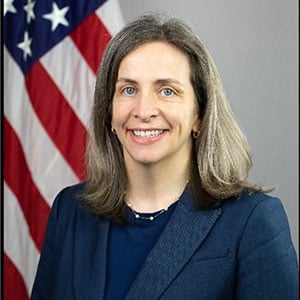
Sarah Ladislaw
Senior Director for Climate and Energy, National Security Council, The White House
Senior Director Sarah Ladislaw leads the U.S. National Security Council’s (NSC) Climate and Energy Directorate, responsible for coordinating national security policy on issues including the climate crisis, energy security, stability and reliability, and strengthening environmental sustainability.
Sarah previously was a Managing Director at RMI (Rocky Mountain Institute), where she led the US Program. She also worked on other global initiatives including the Mission Possible Partnership to reduce industrial-sector emissions and supports the development of green banks.
Prior to RMI, Sarah was Senior Vice President and Director of the Energy Security and Climate Change Program at the Center for Strategic and International Studies (CSIS). At CSIS, Sarah led the think tank’s work in energy policy, geopolitics, and technology analysis. She spearheaded new work at CSIS on climate change and foreign policy, deep decarbonization, and just transitions.
Before CSIS, Sarah worked in the Office of the Americas in the US Department of Energy’s Office of Policy and International Affairs, where she covered a range of economic, political, and energy issues in the Western Hemisphere. In addition, she spent a short time working at Statoil as its senior director for international affairs in the Washington office.
Sarah holds a Bachelor of Arts in International Affairs/East Asian Studies and Japanese Language and a Masters in International Affairs/International Security from The George Washington University.
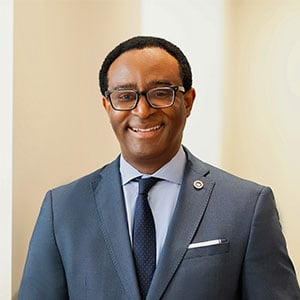
Ben Vinson III, Ph.D.
President, Howard University
Dr. Ben Vinson III is the 18th president of Howard University and a tenured professor of history in the University’s College of Arts and Sciences. As president, he is tasked with inspiring, innovating, and strategically leading the Howard community which include undergraduate and graduate students, faculty, and staff.
President Vinson was most recently provost and executive vice president at Case Western Reserve University. During his tenure, Dr. Vinson spearheaded the university’s “Think Big” strategic planning initiative, which received national attention for its innovative and inclusive planning process. He was co-principal investigator of the Humanities in Leadership Learning Series (HILLS) program, funded by a $2 million grant from the Mellon Foundation to promote leadership development and diversity in the humanities.
Dr. Vinson is an accomplished historian of Latin America, and the recipient of the 2019 Howard F. Cline Book Prize in Mexican History for his book, “Before Mestizaje: The Frontiers of Race and Caste in Colonial Mexico.”
Prior to his appointments at Howard and Case Western, Dr. Vinson also served on the faculties of Barnard College, Penn State University, Johns Hopkins University, and George Washington University.
Dr. Vinson earned bachelors’ degrees in history and classical studies from Dartmouth College and a doctorate in Latin American history from Columbia University. He has been awarded fellowships from the Fulbright Commission; National Humanities Center; Social Science Research Council; University of North Carolina at Chapel Hill; and the Ford, Rockefeller, and Mellon foundations.
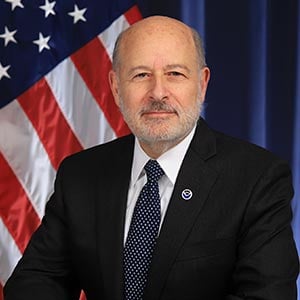
Richard W. Spinrad, Ph.D.
Under Secretary of Commerce for Oceans and Atmosphere & NOAA Administrator
Richard (Rick) W. Spinrad, Ph.D., was sworn in on June 22, 2021 as the under secretary of commerce for oceans and atmosphere and the 11th NOAA administrator. Dr. Spinrad is responsible for the strategic direction and oversight of the agency and its over 12,000 employees, including developing NOAA’s portfolio of products and services to address the climate crisis, enhancing environmental sustainability and fostering economic development, and creating a more just, equitable, diverse and inclusive NOAA workforce.
Most recently, Dr. Spinrad served as a professor of oceanography and senior adviser to the vice president of research at Oregon State University (OSU). He was also vice president for research at OSU from 2010-2014.
Dr. Spinrad served as NOAA’s chief scientist under President Barack Obama from 2014 until 2016. He also led NOAA’s Office of Oceanic and Atmospheric Research and National Ocean Service from 2003- 2010. While at NOAA, Dr. Spinrad co-led the White House Committee that developed the nation’s first set of ocean research priorities and oversaw the revamping of NOAA’s research enterprise, including the development of the agency’s Scientific Integrity Policy.
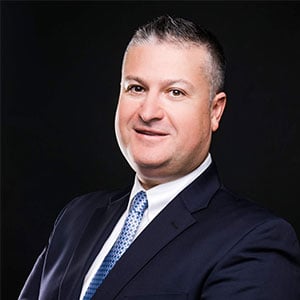
Franco Amalfi
Director, Sustainability Strategic Initiatives and Partnerships - North America, Capgemini
Franco is a sustainability expert and digital transformation global thought leader with more than 25 years of experience in all aspects of sustainability and digital transformation. He is currently the director of sustainability strategic partnerships and initiatives for Capgemini. He is responsible for working with hyperscalers and climate techs to bring to market innovative sustainability solutions to customers in all industries in North America. Prior to joining Capgemini, Franco was the Head of Sustainability Strategy, Global Public Sector for Google Cloud. In this capacity, Franco launched climate insights offerings that are being leveraged globally to inform climate adaptation strategies with science-based climate risks insights.
Franco has advised executives across private and public sector on a global basis, to define business aligned technology strategies, with a focus on delivering business value, with both strategic and financial components.
Franco lives in Montreal, Canada with his wife and two children. He is a graduate of McGill University and has completed an Advanced Certificate for Executives in Management, Innovation, and Technology at MIT Sloan.
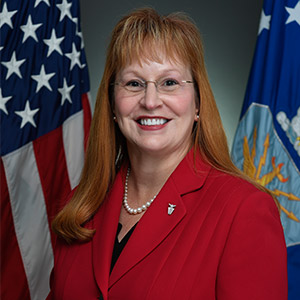
Nancy J. Balkus, P.E., SES
Deputy Assistant Secretary, the Air Force for Environment, Safety and Infrastructure, Headquarters U.S. Air Force
Nancy J. Balkus, a member of the Senior Executive Service, is the Deputy Assistant Secretary of the Air Force for Environment, Safety and Infrastructure, Headquarters U.S. Air Force. She provides executive leadership on all matters pertaining to formulation, review and execution of plans, policies, programs and budgets for Air Force built and natural infrastructure, environmental, installation energy, safety, occupational health, and resilience integration programs. These include facility management, military construction, utilities privatization, energy security, contingency energy, environmental compliance and restoration, occupational safety and workplace health. Ms. Balkus graduated from the U.S. Air Force Academy in 1988. She has served in a variety of positions at the squadron, base, forward operating agency, major command and headquarters level in the contiguous United States and overseas. She is a registered professional engineer in the State of Texas.
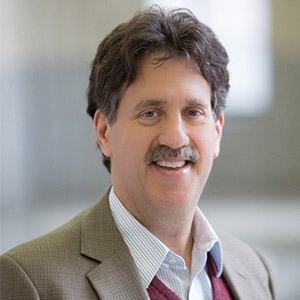
David Balton
Executive Director, Arctic Executive Steering Committee
David Balton is the Executive Director of the U.S. Arctic Executive Steering Committee, which advances and coordinates and U.S. policies and activities in the Arctic region.
He previously served as the Deputy Assistant Secretary for Oceans and Fisheries in the U.S. Department of State, attaining the rank of Ambassador in 2006. Ambassador Balton was responsible for coordinating the development of U.S. foreign policy concerning oceans and fisheries, and overseeing U.S. participation in international organizations dealing with these issues. Ambassador Balton functioned as the lead U.S. negotiator on a wide range of agreements in the field of oceans and fisheries and has chaired numerous international meetings. He was also a Senior Fellow at the Woodrow Wilson International Center for Scholars.
During the U.S. Chairmanship of the Arctic Council (2015-2017), he served as Chair of the Senior Arctic Officials. His prior Arctic Council experience included co-chairing the Arctic Council Task Forces that produced the 2011 Agreement on Cooperation on Aeronautical and Maritime Search and Rescue in the Arctic and the 2013 Agreement on Cooperation on Marine Oil Pollution Preparedness and Response in the Arctic. He separately chaired negotiations that produced the Agreement to Prevent Unregulated High Seas Fisheries in the Central Arctic Ocean.
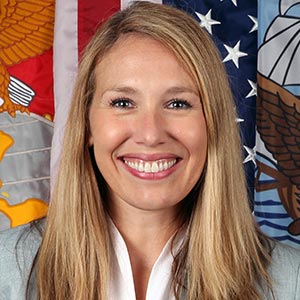
Honorable Meredith Berger
Assistant Secretary of the Navy (Energy, Installations, and Environment)/Chief Sustainability Officer
The Honorable Meredith Berger assumed the responsibilities of the Assistant Secretary of the Navy for Energy, Installations & Environment on July 28, 2021. She is responsible for providing oversight and policy for Navy and Marine Corps energy and climate resilience; infrastructure sustainment, restoration and modernization; military construction; acquisition, utilization and disposal of real property and facilities; environmental protection, planning, restoration and natural resources conservation; and safety and occupational health.
Ms. Berger has served in a variety of policy and senior leadership positions in both federal and state government and the private sector. Before her nomination, Ms. Berger was a senior manager for the Defending Democracy Project at Microsoft Corporation. She was a Fellow with the Harvard Kennedy School’s Belfer Center for Science and International Affairs.
Ms. Berger was Deputy Chief of Staff to Secretary of the Navy Ray Mabus, advising the Secretary on the formulation and execution of Department-wide strategy, policies, plans, and standards.
Ms. Berger also served as a Department of Defense Fellow. Prior to her tenure with the Department of the Navy, Ms. Berger held policy positions with the Environmental Protection Agency and the Office of the State of Florida Chief Financial Officer.
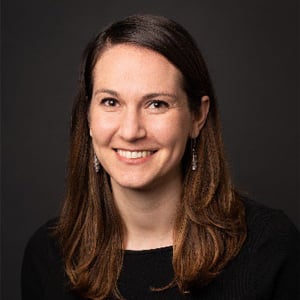
Annalise Blum, PhD.
Deputy Assistant Secretary for Water and Science, Department of the Interior
Dr. Annalise Blum is a hydrologist with expertise in climate, water and national security policy. She serves as the Deputy Assistant Secretary for Water and Science at the U.S. Department of the Interior working closely with the U.S. Geological Survey and the Bureau of Reclamation. Previously, she served at the U.S. Department of Defense as Senior Advisor for Climate Policy and an American Association for the Advancement of Science (AAAS) Science & Technology Policy Fellow, for which she was awarded the Office of the Secretary of Defense Medal for Exceptional Public Service. She has served as a lecturer in Environmental Sciences and Policy and a postdoctoral fellow in Global Change at Johns Hopkins University. Blum has over a decade of experience leading multi-disciplinary research focused on water security, extreme events, and the impacts of climate change and has also worked at the National Academy of Sciences, the American Meteorological Society, the US Geological Survey, and the Harvard Kennedy School of Government. She holds a Ph.D. in environmental and water resources engineering from Tufts University, M.S. from UNC-Chapel Hill, and B.S. from Stanford University.
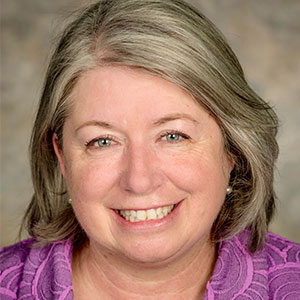
Honorable Sharon E. Burke
President, Ecospherics and Co-Founder, Ecosecurity Council
Honorable Sharon E. Burke is the President of Ecospherics, a research and consulting firm that focuses on climate change, energy, critical minerals, and food security. She is also the Co-Founder with Dr. Rod Schoonover of the Ecosecurity Council, a non-profit organization dedicated to policy solutions for ecosphere security. Throughout her career, Burke has worked to balance national security and environmental sustainability, with a focus on ideas that scale through public policy. She has been a leader at several civic organizations and in the U.S. government, most recently as part of the Biden-Harris transition team. Burke served as a Member of the State Department's Policy Planning staff In the George W. Bush Administration and in the Obama Administration as the Assistant Secretary of Defense for Operational Energy. In that post, Burke released the first departmental operational energy strategy, invested in RDT&E, and promoted the rapid fielding of renewable and efficient energy technologies into combat operations. In recognition of her work, the Secretary of Defense awarded her the Distinguished Civilian Service Medal. Burke is a frequent public speaker, published writer, and strategic advisor to corporate boards, national laboratories, and U.S. government agencies.

Douglas Chan
Chief Operating Officer, Climeworks
Douglas Chan oversees the Operations of Climeworks, building on his experience leading manufacturing and energy projects around the world. Douglas is responsible for Climeworks’ plant operations as well as structuring the supply chain, project execution, and production teams that are needed to enable direct air capture and storage (DAC+S) to reach gigaton capacity by 2050. He also serves as General Manager US, leading Climeworks' business expansion into the United States. Before Climeworks, Douglas was latest with Tesla, where he contributed to scaling operations internationally. Douglas is from Australia and splits his time between Switzerland and the US.
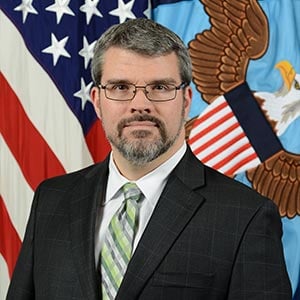
John Conger
President, Conger Strategies and Solutions, LLC.
John Conger is President of Conger Strategies and Solutions, Director Emeritus of the Center for Climate and Security, Senior Advisor to the Council on Strategic Risks, Senior Advisor to the International Military Council on Climate and Security, and a Senior Advisor at WestExec Advisors.
Formerly, Mr. Conger served in senior positions at the Department of Defense, including Principal Deputy Under Secretary of Defense (Comptroller), with oversight of the DoD budget, and Acting Assistant Secretary of Defense (Energy, Installations and Environment). In the latter role, Mr. Conger oversaw a portfolio that included climate change (leading development of the DoD Climate Change Adaptation Roadmap), energy security, environmental remediation, base closure, and management of nearly a trillion dollars of real property.
Previously, Mr. Conger spent more than a decade on Capitol Hill in multiple personal office and committee staff roles.
He has a B.S. and an M.S. in Aeronautics and Astronautics from the Massachusetts Institute of Technology and an M.A. in Science, Technology and Public Policy from the George Washington University.

Julia Kumari Drapkin
CEO and Founder, ISeeChange
Julia Kumari Drapkin is the CEO of ISeeChange, a climate data and engagement platform to help cities monitor, design, and maintain climate ready infrastructure. Cities have used ISeeChange to generate over 25M in infrastructure investments in low income communities. Drapkin founded ISeeChange after reporting natural disasters and climate change for 12 years across the globe and in her own backyard on the Gulf Coast. Under her leadership, ISeeChange has received national awards and recognition from the White House Climate Data Initiative, NASA, MIT Solve, Echoing Green, Village Capital, Grist, AGU, the AAAS, Verizon, Exelon, Morgan Stanley, and the National Science Foundation. Drapkin also serves on the American Meteorological Society’s Board on Environment and Health.
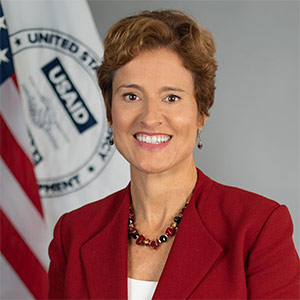
Dina Esposito
Assistant to the Administrator for the Bureau for Resilience, Environment, and Food Security (REFS) at USAID
Dina Esposito serves as the Assistant to the Administrator for the Bureau for Resilience, Environment, and Food Security (REFS) at USAID, Feed the Future Deputy Coordinator for Development, and the Agency’s Global Food Crisis Coordinator.
Most recently, Dina served five years at Mercy Corps (MC), a global organization focused on helping build more resilient, inclusive communities in some of the most fragile contexts in the world through development, humanitarian response, and peacebuilding programs. She served there as Vice President for Technical Leadership, guiding a team of subject matter experts who provide strategy, program design and technical support for Mercy Corps’ global vision and for country teams in more than 40 countries. Economic development (with a focus on agriculture and youth employment), food security, water security, and conflict and governance were her areas of focus. She also directed the MC Research and Learning team, which prioritized research on “what works” in terms of building resilience and advancing peace in areas impacted by climate change and conflict, particularly within the framework of food security programs.
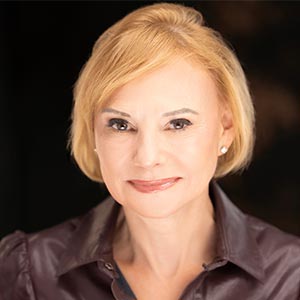
Sherri Goodman
Senior Fellow, Environmental Change & Security Program and Polar Institute, Woodrow Wilson International Center
Sherri Goodman is an experienced leader and senior executive, lawyer and director in the fields of national security, climate change, energy, science, oceans and environment. Goodman is Secretary General of the International Military Council on Climate & Security, the global forum for military leaders and security professionals dedicated to addressing the security risks of a changing climate. She is a Senior Fellow at the Woodrow Wilson International Center, and Senior Strategist at the Center for Climate and Security. Previously, she served as the President and CEO of the Consortium for Ocean Leadership.
Goodman served as Senior Vice President and General Counsel of CNA (Center for Naval Analyses) where she was also the founder and Executive Director of the CNA Military Advisory Board, whose landmark reports include National Security and the Threat of Climate Change (2007), and National Security and the Accelerating Risks of Climate Change (2014), Advanced Energy and US National Security (2017), and The Role of Water Stress in Instability and Conflict (2017) among others. The film The Age of Consequences in which Goodman is featured, is based on the work of the CNA Military Advisory Board.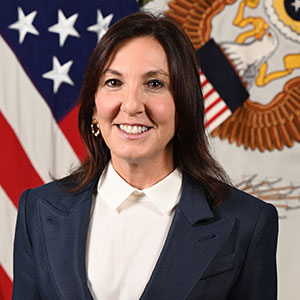
Rachel Jacobson
Assistant Secretary of the United States Army Installations, Energy and Environment
Ms. Rachel Jacobson was confirmed by the U.S. Senate on March 15, 2022, and sworn in as the 17th Assistant Secretary of the U.S. Army for Installations, Energy and Environment (ASA(IE&E)) on April 4, 2022.
As ASA (IE&E), she is the primary advisor to the Secretary of the Army and Chief of Staff of the Army for all matters related to Army installation policy and oversight, and coordination of energy security and management. In addition, she is responsible for policy and oversight of sustainability and environmental initiatives; resource management, including design, military construction, operations and maintenance; Base Realignment and Closure (BRAC); privatization of the Army real estate portfolio and installation Safety and Occupational Health programs.
Ms. Jacobson is an experienced environmental lawyer, having previously served at the Department of Defense during the Obama-Biden Administration as the Deputy General Counsel for Environment, Energy and Installations. Prior to joining DoD, Ms. Jacobson served as a political appointee at the Department of the Interior, first as Principal Deputy Solicitor and then as Acting Assistant Secretary for Fish and Wildlife and Parks.
Ms. Jacobson, who came to the Army position following five years in private practice at the law firm Wilmer Hale in Washington, D.C., spent the majority of her career as a trial lawyer and supervisor at the U.S. Department of Justice in the Environment and Natural Resources Division. She also ran a conservation program at the National Fish and Wildlife Foundation before joining the Obama-Biden Administration.

Alex Laplaza
Advisor, Lowercarbon Capital

Anthony Leiserowitz, Ph.D.
Director of the Yale Program on Climate Change Communication and a Senior Research Scientist, Yale University
Anthony Leiserowitz, Ph.D. is the founder and Director of the Yale Program on Climate Change Communication and a Senior Research Scientist at the Yale School of the Environment. He is an internationally recognized expert on public climate change beliefs, attitudes, policy support, and behavior, and the psychological, cultural, and political factors that shape them and conducts research globally, including in the United States, China, India, and Brazil. He has published more than 350 scientific articles, chapters, and reports and has worked with the Intergovernmental Panel on Climate Change, the National Academy of Sciences, the Smithsonian Museum of Natural History, the Harvard Kennedy School, the United Nations Development Program, the Gallup World Poll, and the World Economic Forum, among others. He is a recipient of the Friend of the Planet Award from the National Center for Science Education, the Mitofsky Innovator Award from the American Association of Public Opinion Research, the Stephen H. Schneider Award for Outstanding Climate Science Communication from Climate One, and an Environmental Innovator award from the Environmental Protection Agency. In 2020, he was named the second-most influential climate scientist in the world (of 1,000) by Reuters. He is also the host of Climate Connections, a radio program broadcast each day on more than 700 stations nationwide.
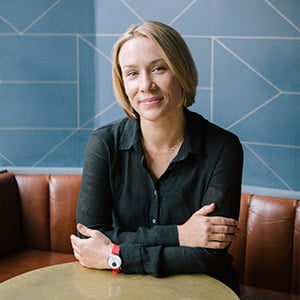
Katie MacDonald
Co-Founder, Tailwind
Katie MacDonald is a climate activist, investor, and innovation policy expert who has been working on climate change since she skipped school at 17 to protest for offshore wind. She is the co-founder of Tailwind, an innovation studio focused on accelerating innovation for climate adaptation and resilience solutions. Before Tailwind, Katie served as Director of Tech to Market at the New York State Energy Research and Development Authority (NYSERDA) where she was responsible for the organization’s early-stage startup investment portfolio. In her role Katie oversaw a portfolio of over $200M in investments and including innovation programs focused on building decarbonization, finance and insurance, energy storage supply chain development, product manufacturing, industrial decarbonization, and carbon removal.
Katie launched several new programs while at NYSERDA including the organization’s first ever startup equity investment program (New York Climate Progress), the nation’s first $20M research and commercialization hub for carbon removal companies based at Columbia University (the Carbontech Development Initiative), and the first publicly funded Insurance Accelerator. Katie also led the development of a new partnership between NYSERDA, and the country of Denmark focused on carbon removal and green hydrogen innovation that was announced at COP26.
Previously, Katie led Partnerships at Greentown Labs, North America’s largest climate tech incubator, where she founded the ‘Greentown Go’ program and ran seven unique accelerators designed to commercialize climate solutions from green hydrogen to advanced energy storage. Katie’s work at Greentown has enabled companies to raise over $300M (and counting) in follow-on funding.
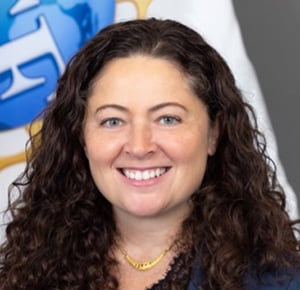
Jennifer Mercer
Head of Arctic Sciences in the Office of Polar Programs, National Science Foundation
Dr. Jennifer Mercer is Head of Arctic Sciences in the Office of Polar Programs at the National Science Foundation (NSF) where she oversees the facilitation of scientific research across the Arctic through myriad disciplines and approaches. She previously held positions at the US Army Cold Regions Research and Engineering Laboratory and at the University of Wyoming. Dr. Mercer has been conducting research, leading projects, and overseeing scientific research in the Arctic and Antarctic environments for over two decades and has peer-reviewed publications in the fields of organic geochemistry, atmospheric and cryospheric science, polar engineering, and Arctic science diplomacy. Dr. Mercer has served as Chair of the international Forum of Arctic Research Operators (FARO) for the past 6 years. In 2017, she completed an Embassy Science Fellowship (ESF) with the U.S. Embassy in Denmark where she was seated in Nuuk, Greenland with the Government of Greenland (Kalaallit Nunaat). She focused on increasing engagement between the Greenland and U.S. research communities. Dr. Mercer was a Scientific Advisory Board (SAB) member for the One Planet Polar Summit and currently serves on the SAB for the European POLARIN program and is part of the U.S. Interagency Arctic Research Policy Committee (IARPC). The juxtaposition of her experiences working in academia, the Department of Defense, and NSF have uniquely positioned her as an Arctic leader in the US government. She received her PhD from Dartmouth College and her bachelor’s degree from Black Hills State University.
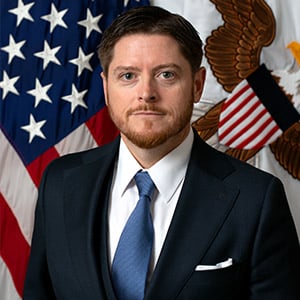
Brendan Owens
Office of the Assistant Secretary of Defense (Energy, Installations, and Environment)
The Honorable Brendan Owens was sworn in as Assistant Secretary of Defense for Energy, Installations, and Environment on January 26, 2023. In this role, he is the principal advisor to the Under Secretary of Defense for Acquisition and Sustainment for all matters relating to operational and facility energy; installations real property planning, operations, and sustainment; environment protection, compliance, and restoration; natural, historical and cultural resources; and accompanied and unaccompanied military housing. He oversees the Department of Defense’s real property portfolio encompassing millions of acres and over 500,000 buildings and structures at more than 500 installations, and additionally serves as the Chief Sustainability Officer and Chief Housing Officer for the Department of Defense.
Prior to his appointment, Mr. Owens served as Principal of Black Vest Strategy, a consultancy focused on the intersection of health, equity, and climate issues in the built environment. He was also a co-founder of Ecountabl, Inc., a technology platform seeking to democratize access to corporate environmental, social, and governance information.
Previously, Mr. Owens had a 19-year career with the U.S. Green Building Council (USGBC). At USGBC, Mr. Owens supported the technical development of USGBC’s LEED Green Building Rating System, as well as the creation of numerous other building sector standards and codes for high performance, zero energy and grid interactive buildings. He has experience across supply and demand sectors of the energy industry, buildings, and infrastructure with a focus on integrative technology and inclusive policy to optimize outcomes.
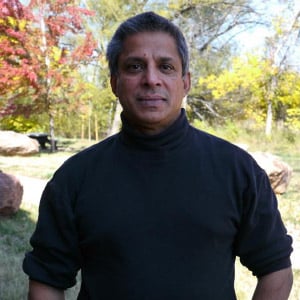
Roger S. Pulwarty PhD
Senior Scientist, NOAA
Roger S. Pulwarty is the Senior Scientist in NOAA’s Physical Sciences Laboratory in Boulder, Colorado. Dr. Pulwartys’ research and over 120 publications focus on climate, water, disaster reduction, and resilience. He has also helped develop and lead landmark programs integrating science and services, including the National Integrated Drought Information System, the NOAA Regional Integrated Sciences and Assessments/Climate Adaptation Partnerships, and GEF Mainstreaming Adaptation in the Caribbean. Roger has served as a convening lead author on the IPCC, the UN Office of Disaster Risk Reduction, the International Science Council, and the U.S. National Climate Assessments, among others. He has presented before the US Congress, the UN General Assembly, and OAS Ministerial Meetings among others. He co-chairs the Sub-committee on Resilience Science and Technology and the UN WMO Climate Services Information System implementation. Roger is a Fellow of the American Meteorological Society, the American Geophysical Union, the American Indian Science and Engineering Society, and the European Academy of Water Resources Engineers and Scientists. His work on science and decision-making has been awarded internationally and nationally, including by the Government of Trinidad and Tobago and with the 2022 U.S. President’s Distinguished Rank Award. He is Professor Adjunct to the University of Colorado, Boulder, and the University of the West Indies.

Ben Reinke
Vice President of Global Business Development, X-energy
As Vice President of Global Business Development, Dr. Reinke leads the Business Development organization at X-energy and is responsible for end-to-end commercial reactor business development and sales – strategy and marketing, analytics, organizational management, customer relationship development, contract negotiations, capture management, and early-phase project management.
Dr. Reinke is an energy executive with expertise in science and innovation, clean energy technology development, industries of the future, nuclear systems, critical minerals and materials, space science and technology, and the nexus of energy security and national security. His policy development and implementation experience spans both the legislative and executive branches. Prior to joining X-energy, Dr. Reinke served as the Executive Director of the Office of Strategic Planning and Policy of the Department of Energy (DOE) and Senior Advisor to the Secretary of Energy. Before moving to DOE, Dr. Reinke served as majority professional staff on the Senate Committee on Energy and Natural Resources, where he led departmental oversight and development of law spanning a range of energy issues including technology development, batteries and grid storage, workforce, microgrids and integrated energy systems, nuclear energy, and
university R&D.
Dr. Reinke holds his Ph.D. and M.S. in nuclear engineering, as well as his B.S. in physics and French from the Ohio State University, where he was a NASA Space Technology Research Fellow and a Nuclear Regulatory Commission Fellow.
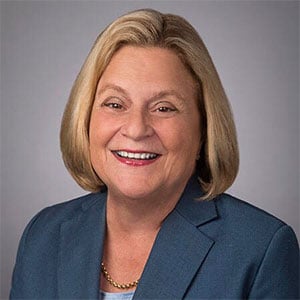
Ileana Ros-Lehtinen
Ileana Ros-Lehtinen, Senior Advisor, Akin/Member of Congress 1989 - 2019
As the first Hispanic woman elected to Congress with a public service career that spans nearly four decades, Ileana brings institutional knowledge, expertise, and experience across diverse domestic and international affairs policy matters.
Throughout her Congressional career, in her various roles on the House Committee on Foreign Affairs, including as Chair, she led on pressing foreign policy issues, including championing the advancement of freedom and democracy for all; fighting Islamist extremism; supporting and strengthening the U.S. – Israel partnership; supporting free trade agreements with Colombia, Panama, and South Korea; imposing sanctions on human rights violators in Venezuela; and fighting against tyranny and oppression, particularly in her native homeland of Cuba.
Ileana also served on the House Permanent Select Committee on Intelligence and was a member of the CIA Subcommittee and the National Security Agency and Cybersecurity Subcommittee.
Ileana earned a doctorate from the University of Miami, Master’s and Bachelor’s degrees from Florida International University, and an Associate’s degree from Miami Dade College. She began her career as a Florida certified teacher, and then founded, and served as the principal of, a private bilingual elementary school. She is married to Dexter Lehtinen, former US Attorney for the Southern District of Florida, and a decorated Vietnam combat veteran. They have four adult children and nine grandchildren.
In 2019, Ileana joined Akin as a Senior Advisor and serves on boards of varied non-profit organizations that share her passion for foreign affairs policy issues and mentorship of future generations of leaders.
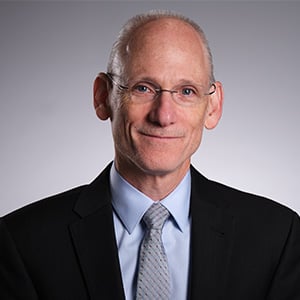
Aaron Salzberg, Ph.D.
Director of the Water Institute and Distinguished Holzworth Professor, Department of Environmental Sciences and Engineering, University of North Carolina
Aaron Salzberg is the Director of the Water Institute at the University of North Carolina. The goal of the Water Institute is to contribute to a more water secure by advancing research, policy, and practice. From 2010 to 2017, Aaron served as the Special Coordinator for Water at the U.S. Department of State where he managed the development and implementation of U.S. foreign policy on drinking water and sanitation, water resources management, and transboundary water issues. He was the first person to hold this title. In this role, Aaron led the development of the first U.S. Global Water Strategy. Aaron has a Ph.D. in Genetic Toxicology and a Master of Science degree in Technology and Policy from the Massachusetts Institute of Technology, and Masters and Bachelor of Science degrees in Aerospace Engineering from the University of Maryland. He currently holds an appointment as a Global Fellow at the Woodrow Wilson Center and as a Senior Fellow at the Center for Strategic and International Studies and serves on the World Meteorological Organization’s Scientific Research Board where he led the development of the WMO’s first research strategy on hydrology. Aaron also serves on the U.S. National Academies of Sciences National Climate Security Roundtable assessing climate-related risks to U.S. national security and on the U.S. Global Change Research Program.
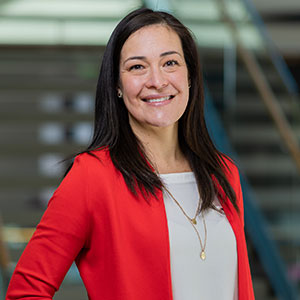
Mónika Serrano
Resilience Program Manager, Turner Construction Company
Mónika Serrano leads Turner Construction's resilience program and brings 20 years of experience in the construction industry. Passionate about addressing climate change, she actively promotes climate adaptation in the built environment. Mónika serves on the Board of Advisors for the National Institute of Building Sciences, is a member of the ASTM Property Resilience Assessment task force, and contributes to the LEED v5 Resilience Working Group. With three years on the USGBC NJ Board of Directors, she has presented at various events on topics such as resilience value, climate adaptation, resilient design, and construction. Mónika collaborates across design, engineering, construction, risk, insurance, and legal sectors, emphasizing the importance of partnerships for creating a resilient world. She co-hosts the podcast "Adapt: Climate Change and the Built Environment."
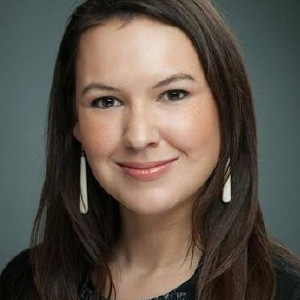
Raina Thiele (Tentative)
Senior Advisor to the Secretary Alaska and Strategic Priorities, Department of the Interior
Raina Thiele serves as Senior Advisor to the Secretary of the Interior for Alaska Affairs and Strategic Priorities. She serves as the Department of the Interior’s policy lead on issues related to Alaska, which comprises a large proportion of the Department’s overall portfolio. She has spent her career in public service, the private sector, and the nonprofit sector. In her previous public service role she was President Obama’s tribal liaison and led planning for President Obama’s historic 2015 trip to Alaska. Raina was born and raised in Alaska and her family hails from Pedro Bay Village on Lake Iliamna and Alexander Creek. She is Dena’ina Athabascan and Yup’ik.

Sonam Velani
Co-Founder and Managing Partner, Streetlife Ventures
Sonam Velani is the Co-Founder and Managing Partner of Streetlife Ventures, an early stage venture fund that invests at the intersection of cities and climate. Sonam has worked across the world and across the public and private sectors, connecting the dots between the built environment and urban infrastructure.
Prior to co-founding Streetlife, Sonam financed $10 billion of transportation, energy, and water infrastructure projects at Goldman Sachs, helped build coastal protection and water systems in Asia at the World Bank, launched drone mobility solutions in Africa at Zipline, and developed New York City’s $15 billion Green New Deal at the NYC Mayor's Office.
Sonam is a strong believer in paying it forward and loves being active in her community. She has received the National President’s Volunteer Service Award, launched the Climate Tech Cities community to foster collaboration across climate tech, policy, and justice groups, runs the Parachute creative storytelling platform on climate solutions and investment opportunities in cities globally, and volunteers with the Aga Khan Development Network, the Women's Impact Alliance, and the Girl Scouts.
Sonam enjoys sharing ideas about urban development and has spoken at the UN COP Climate Summits, C40, and more. The first in her family to go to college, Sonam attended Harvard University on a full scholarship and received a BA in Government, Economics, and Visual and Environmental Studies.
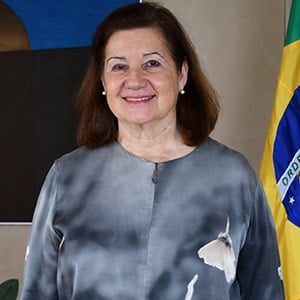
Maria Luiza Ribeiro Viotti
Ambassador of Brazil to the United States
Ambassador Maria Luiza Ribeiro Viotti presented her credentials to President Joe Biden on June 30, 2023.
Before assuming her duties in Washington, Ambassador Viotti served as Chef de Cabinet to the Secretary-General of the United Nations (2017-2021), Under Secretary General for Asia and the Pacific at the Brazilian Ministry of Foreign Affairs (2016), and Ambassador of Brazil to Germany (2013-2016).
Ambassador Viotti served on multiple occasions at the Mission of Brazil to the United Nations in New York and as Permanent Representative to the UN from 2007 to 2013. During her tenure, she led the Brazilian Delegation to the UN Security Council (2010-2011) and presided over the Council in February 2011.
In addition to multilateral affairs, Ambassador Viotti worked in Brasilia and abroad in areas such as political affairs, trade and investment promotion, public diplomacy and regional cooperation. She served as counselor at the Embassy of Brazil in La Paz (1993-1996).
Past Keynote Speakers and Panelists
-
Tammy Ma, Ph.D.
Lead, Inertial Fusion Energy Initiative, Lawrence Livermore National LaboratoryTammy received her B.S. from Caltech, then M.S. and Ph.D. from UC San Diego. She is the recipient of a Presidential Early Career Award for Science and Engineering (PECASE) and currently sits on the Fusion Energy Sciences Advisory Committee (FESAC), providing advice to the U.S. Department of Energy’s Office of Science (DOE-SC) on complex scientific and technological issues related to fusion energy and plasma research. -
Todd Allen Ph.D
Professor & Chair, University of MichiganDr. Todd Allen is Professor at the University of Michigan and a Senior Fellow at Third Way, a DC base Think Tank, supporting their Clean Energy Portfolio. Prior to joining the University of Michigan, he was the Deputy Director for Science and Technology at the Idaho National Laboratory and a Professor in the Engineering Physics Department at the University of Wisconsin. -
Linnea Avallone
Chief Officer for Research Facilities, National Science FoundationLinnea Avallone is the Chief Officer for Research Facilities at the National Science Foundation, where she has oversight of the agency’s major and mid-scale research infrastructure. Prior to her current role, she served as the program manager of the Lower Atmosphere Observing Facilities in the Division of Atmospheric and Geospace Sciences and subsequently as Senior Advisor for Facilities in the Geosciences Directorate. -
John Balbus
Director, Office of Climate Change and Health Equity, OASHDr. Balbus is the Acting Director of the new Office of Climate Change and Health Equity within the Office of the Assistant Secretary for Health at the U.S. Department of Health & Human Services. A physician and public health professional with over 25 years of experience working on the health implications of climate change, Dr. Balbus has served as HHS Principal to the U.S. Global Change Research Program and co-chair of the working group on Climate Change and Human Health for the U.S. Global Change Research Program since he joined the federal government in 2009. -
Sally Benson
Deputy Director for Energy, Office of Science and Technology PolicyDr. Benson serves as Deputy Director for Energy & Chief Strategist for the Energy Transition at OSTP. Trained as an earth scientist and engineer, she is an expert on wide variety of topics related to energy and the environment. For the past 25 years, she has focused on deep decarbonization of the global energy system. She comes to OSTP from Stanford University where she is the Precourt Family Professor of Energy Resources Engineering, in the School of Earth, Energy and Environmental Sciences. -
Asmeret Asefaw Berhe
Director, Office of Science, U.S. Department of EnergyDr. Asmeret Asefaw Berhe is the Director of the Office of Science for the U.S. Department of Energy. Dr. Berhe was most recently a Professor of Soil Biogeochemistry; the Ted and Jan Falasco Chair in Earth Sciences and Geology; and Associate Dean for Graduate Education at the University of California, Merced. Her research focus lies at the intersection of soil science, global change science, and political ecology with an emphasis on how the soil system regulates the earth’s climate and the dynamic two-way relationship between the natural environment and human communities.
-
Elie Bou-Zeid
Professor of Civil & Environmental Engineering, Princeton UniversityElie Bou-Zeid is Professor of Civil and Environmental Engineering at Princeton University. An expert in atmospheric physics and micrometeorology, Prof. Bou-Zeid serves on the executive board for the Princeton-Geophysical Fluid Dynamics Lab Cooperative Institute for Modeling the Earth System and is Editor of the American Meteorological Society's Journal of the Atmospheric Sciences. -
Karen Boyd
Senior Manager Carbon Services, TruterraBoyd leads the Carbon Operations team at Truterra, the sustainability business of farmer-owned cooperative Land O’Lakes, where she works to advance regenerative agriculture practices through the company’s carbon program. -
Ranveer Chandra
Managing Director, Research for Industry, CTO Agri-Food, Microsoft ResearchRanveer Chandra is the CTO of Agri-Food, Managing Director of Research for Industry, and Head of Networking Research at Microsoft Research in Redmond, WA. Ranveer’s research has shipped in multiple Microsoft products, including XBOX, Azure, Windows, and Visual Studio. He started the FarmBeats project in 2015, which shipped as a Microsoft product in 2019. Bill Gates has featured Ranveer’s FarmBeats work on GatesNotes and was invited to present to the Secretary of Agriculture. -
Sweta Chakraborty
CEO of North America, We Don't Have TimeDr. Sweta Chakraborty is a climate behavioral scientist who is regularly interviewed on major, international news media outlets like CNN, the BBC, MSNBC, etc. Sweta is the US President for We Don't Have Time, the world's largest social media and communications company for accelerating climate solutions. She is a partner at Pioneer Public Affairs and is on the steering committee of the Global Commons Alliance. -
Jessica Cross, Ph.D.
Research Oceanographer, NOAADr. Cross is a research scientist that works at the interface between the research and engineering communities to develop new tools to explore how our oceans support sustainable development and contribute to climate risk management. As an oceanographer with NOAA, she leads the agency's Carbon Dioxide Removal Task Force and manages the carbon system observing, research, and development for the Alaska and Pacific Arctic regions. -
Dan Ferber, Ph.D.
Senior Editor, Community & Partnerships Editorial, Springer NatureDan Ferber is the coauthor, with Paul Epstein, M.D., of Changing Planet, Changing Health, the first book on the human health impacts of climate change. He is a senior editor at Springer Nature, where he edits branded and custom content for Nature and Scientific American. Before joining Springer Nature, he was an award-winning journalist focusing on science, health and sustainability. -
Christine King
Director, Gateway for Accelerated Innovation in Nuclear (GAIN)As Director of the Gateway for Acceleration in Nuclear (GAIN) initiative, Christine King facilitates a range of public-private partnerships to help move innovative nuclear energy technologies toward commercialization, while ensuring the continued safe, reliable, and economic operation of the existing nuclear fleet. In addition, GAIN works to ensure that clean energy plans value the opportunity nuclear energy provides to meet decarbonization and sustainability goals. -
David Judi
Director, Earth Systems Science, Pacific Northwest National LaboratoryDr. David Judi is the Director of the Earth Systems Science Division (ESSD) in the Energy and Environment Directorate (EED) at Pacific Northwest National Laboratory (PNNL). In this role, Dr. Judi leads more than 300 staff who focus on developing scientific basis and understanding of Earth system processes and the development of technologies and engineering solutions to enable energy sustainability, resilience, and security. -
Kat Knauer
CTO of the BOTTLE Consortium; Senior Researcher, NRELDr. Kat Knauer is a polymer scientist who has dedicated her scientific career to mitigating plastic waste and its effects on climate. She has a PhD in Polymer Science and Engineering from the University of Southern Mississippi and completed the BASF PhD Leadership Development Program (LDP) in 2018 before taking a Senior Scientist role in BASF’s Plastics Division. Her research efforts focused on advanced recycling technologies which ultimately led her to leading Materials Innovation R&D at Novoloop, a chemical recycling startup. -
Kel Markert
Cloud Geographer, GoogleKel Markert is a Cloud Geographer at Google. His work focuses on enabling users to leverage cloud computing for sustainability solutions and geospatial analyses. He is an expert in Google Earth Engine as well as geospatial processing using cloud technology. Prior to Google, Kel was a research scientist at the NASA SERVIR Science Coordination Office based in Huntsville, AL, USA supporting international organizations in leveraging satellite data and geospatial technology to address climate challenges, particularly for water resources.
-
Linda Molnar
Program Director, NSFDr. Linda K. Molnar is a scientist and entrepreneur with more than 20 years of experience in the life science and chemical industries, integrating her scientific research and engineering background with commercialization for startups, and international, government, and business environments. Currently, Linda is a Program Director for the NSF Convergence Accelerator Program in the new Technology, Innovations, and Partnerships (TIP) Directorate at the U.S. National Science Foundation (NSF). The Convergence Accelerator is designed to accelerate the transition of use-inspired convergence research into practice in areas of national importance. -
Kevin Nordt
Kevin Nordt, Chief Resource Officer, Grant PUDKevin Nordt, Chief Resource Officer, joined Grant PUD in 2004. He was appointed to the position of Chief Resource Officer in January 2022 after stepping down as General Manager-CEO for health reasons. Nordt had served as Grant’s Chief Executive Officer from June 2016 through December 2021. He has over thirty years of experience in the power industry having served in a variety of engineering, marketing, trading and operations positions. Past regional employment includes positions with Portland General Electric and Energy Northwest. -
Kelly Olson
Sustainable Buildings Lead, Department of Defense Climate Action Team, Office of the Deputy Assistant Secretary of Defense for Environment & Energy Resilience (ODASD(E&ER))Kelly Olson, P.E. is the Sustainable Buildings Lead on the Department of Defense Climate Action Team in the Office of the Deputy Assistant Secretary of Defense for Environment & Energy Resilience (ODASD(E&ER)). Her focus is creating the policy and technical framework to decarbonize new and existing DoD buildings. She received her MS in Civil and Environmental Engineering from Stanford University with a concentration in Sustainable Design and Construction. She is a licensed Professional Engineer. -
Matteo Pasquali
A. J. Hartsook Professor of Chemical Engineering, Chemistry, and Materials Science & NanoEngineering, Rice UniversityMatteo Pasquali is the A. J. Hartsook Professor of Chemical Engineering, Chemistry, and Materials Science & NanoEngineering at Rice University. Concurrently, Prof. Pasquali serves as the Director of the Carbon Hub, a Rice-led initiative whose mission is to build a zero emissions future, where clean hydrogen and carbon materials are co-produced sustainably at large scale from hydrocarbons.
